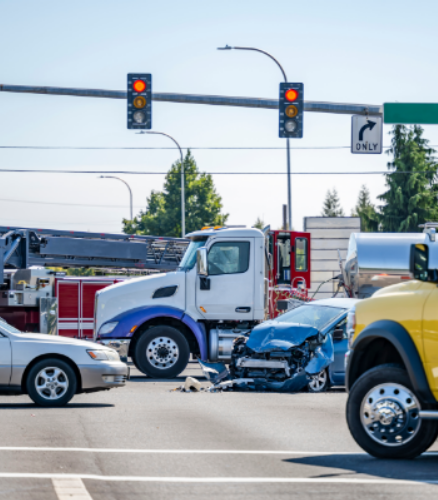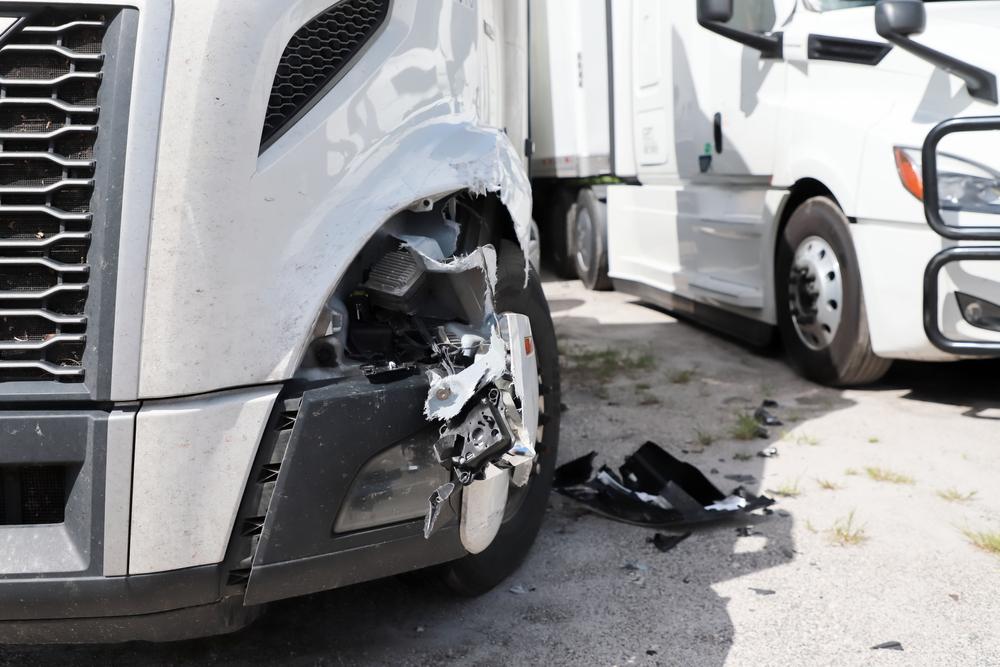

Filing a truck accident lawsuit in Seattle can be a complex and overwhelming process, but understanding the key steps involved can help you navigate the legal system more effectively. Truck accidents often result in severe injuries, extensive property damage, and even fatalities, making it crucial for victims to seek fair compensation. Here's an overview of what you need to know about filing a truck accident lawsuit in Seattle.
First and foremost, it is essential to seek medical attention immediately after the accident. Even if you feel fine initially, some injuries may not manifest symptoms until later. Medical records will also serve as vital evidence when pursuing your claim.
Once you've addressed any immediate health concerns, it's time to gather evidence from the scene of the accident. This includes taking photographs of the vehicles involved, road conditions, skid marks, and any other relevant details. Collect contact information from witnesses who can provide statements supporting your account of the incident.
Next, report the accident to law enforcement authorities. A police report provides an official record of the incident and can be invaluable when establishing fault in your case. Make sure to obtain a copy of this report for your records.
Understanding Washington State's laws is crucial when filing a truck accident lawsuit in Seattle. truck accident lawyer Seattle . Washington operates under a comparative negligence rule, meaning that if you are partially at fault for the accident, your compensation may be reduced by your percentage of fault. Therefore, meticulous documentation and strong legal representation are vital to maximize your potential recovery.
Consulting with an experienced personal injury attorney who specializes in truck accidents is highly recommended. They can help you understand your rights and guide you through each step of the legal process. Your attorney will conduct a thorough investigation to identify liable parties, which may include the truck driver, trucking company, vehicle manufacturer, or even government entities responsible for road maintenance.
Your lawyer will also handle communication with insurance companies on your behalf. It's important to remember that insurers often aim to minimize payouts; having an attorney ensures that you're not pressured into accepting a settlement that's less than what you deserve.
The next step involves filing a formal complaint with the court. This document outlines your allegations against the defendant(s) and specifies the damages you're seeking. After filing this complaint, both parties engage in a discovery phase where they exchange evidence and information pertinent to the case.
Many truck accident lawsuits are settled out of court through negotiations between attorneys representing both sides. However, if a fair settlement cannot be reached, your case may proceed to trial where a judge or jury will determine liability and award damages accordingly.
Damages in truck accident cases can include medical expenses (both current and future), lost wages due to inability to work, property damage repair costs, pain and suffering compensation, and sometimes punitive damages if gross negligence is proven.
In summary, filing a truck accident lawsuit in Seattle requires careful preparation and professional guidance. Seeking immediate medical attention; gathering substantial evidence; understanding local laws; consulting with an experienced attorney; navigating negotiations or potentially going to trial-all these steps collectively aim at ensuring justice is served and fair compensation is awarded for your losses.
Gathering Evidence After the Accident: A Crucial Step in Filing a Truck Accident Lawsuit in Seattle
Navigating the aftermath of a truck accident can be overwhelming, especially when you're dealing with physical injuries, emotional trauma, and mounting medical bills. However, if you're considering filing a truck accident lawsuit in Seattle, gathering evidence after the accident is one of the most critical steps you can take to strengthen your case. This process not only helps in building a solid foundation for your lawsuit but also ensures that you have all the necessary information to seek rightful compensation.
The scene of the accident holds key pieces of evidence that can be pivotal to your case. Immediately after the incident, if you're physically able, start by taking photographs and videos of the scene from various angles. Capture images of vehicle damages, road conditions, traffic signs, skid marks, and any other relevant details like weather conditions or obstructions on the road. These visual records can provide an objective snapshot of what happened and help corroborate your version of events.
In addition to visual evidence, collecting contact information from witnesses is crucial. Eyewitnesses can offer independent accounts that may support your claims about how the accident occurred. Make sure to get their names, phone numbers, and addresses so that they can be contacted later for statements or even depositions if required.
Gathering police reports is another essential aspect. When law enforcement arrives at the scene, they will generally document their observations and compile a report detailing their understanding of how the accident unfolded. Obtain a copy of this report as it provides an official record which includes facts like time, location, involved parties' details, and possibly even citations issued.
Medical records are equally important as they serve as documented proof of your injuries. Seeking immediate medical attention not only prioritizes your health but also creates an official record linking your injuries directly to the accident. Keep meticulous records of doctor visits, treatments received, medications prescribed, and any other related expenses or recommendations for future care.
Do not overlook digital evidence either. Modern trucks are often equipped with Electronic Logging Devices (ELDs), dash cams, or GPS systems that track various aspects like speed or hours driven before an accident occurs. Securing this data might require legal steps such as a subpoena but could provide invaluable insights into factors contributing to the crash.
Communication records should also be preserved carefully. Emails or messages exchanged with insurance companies or trucking firms involved could contain admissions or inconsistencies that may prove useful later on.
Lastly but importantly, consider hiring a reputable personal injury attorney experienced in truck accidents in Seattle as soon as possible. An attorney will guide you through this intricate process and help ensure no critical piece of evidence is overlooked while adhering to Washington State's legal requirements and deadlines for filing claims.
In summary, gathering comprehensive evidence post-accident fortifies your position when filing a truck accident lawsuit in Seattle. From photos at the scene and witness statements to police reports and medical documents-each piece plays its part in reconstructing what happened and proving liability so you can obtain fair compensation for your losses. Taking these steps diligently makes all the difference between a weak claim easily dismissed by insurers versus a robust case compelling enough to warrant serious consideration during settlement negotiations or court proceedings.
When navigating the aftermath of a truck accident in Seattle, it's crucial to understand the intricacies of finalizing settlements and deciding whether to accept an offer or pursue further legal action.. This decision can significantly impact the compensation you ultimately receive, and having a seasoned Seattle truck accident lawyer by your side can make all the difference. Truck accidents are often more complex than typical car accidents due to factors such as the severity of injuries, higher potential for property damage, and multiple parties that could be held liable.

Posted by on 2024-09-16
Choosing the right truck accident lawyer in Seattle can be a daunting task, especially when you're dealing with the aftermath of a traumatic event.. The initial consultation is your opportunity to gauge whether a lawyer is the right fit for you.

Posted by on 2024-09-16
Navigating the aftermath of a truck accident can be an overwhelming and complex ordeal.. Amidst medical treatments, emotional turmoil, and potential financial instability, one pivotal aspect stands out: maximizing compensation and securing a fair final settlement.

Posted by on 2024-09-16
When it comes to choosing the best Seattle truck accident lawyer, making the final decision can feel like navigating a labyrinth.. The attorney you select will play a crucial role in your pursuit of justice and compensation, so it's vital to ensure you're making an informed choice.

Posted by on 2024-09-16
Truck accidents are a grim reality on Seattle's bustling roadways.. The sheer size and weight of these vehicles mean that collisions often result in severe injuries, extensive property damage, and tragically, sometimes fatalities.

Posted by on 2024-09-16
Filing a truck accident lawsuit in Seattle requires an understanding of various legal requirements specific to the state of Washington. This process can be intricate, and knowing the local laws and procedures is crucial for ensuring your lawsuit is filed correctly and effectively.
First, it's important to recognize that Washington operates under a comparative fault system. This means that even if you are partially at fault for the accident, you may still recover damages, although your compensation will be reduced by your percentage of fault. For instance, if you are found to be 20% at fault, your award will be reduced by 20%.
The statute of limitations is another critical factor in filing a truck accident lawsuit. In Washington State, you typically have three years from the date of the accident to file a personal injury lawsuit. Missing this deadline can result in losing your right to pursue compensation altogether.
Next, gathering evidence immediately following the accident is essential. This includes police reports, medical records, photographs of the scene and injuries, witness statements, and any other documentation that supports your claim. Truck accidents often involve complex factors such as driver logs and vehicle maintenance records which need thorough examination.
Engaging with insurance companies also forms a significant part of the process. It's common for insurance adjusters to attempt to settle claims quickly and for less than what victims might be entitled to receive. Having a detailed record of all communications with insurance representatives helps protect your interests.
When it comes time to file the lawsuit itself, drafting a complaint that outlines the specifics of your case is necessary. The complaint should detail how the defendant (typically the truck driver or trucking company) was negligent and how this negligence caused your injuries. Legal representation can be particularly valuable at this stage because an experienced attorney will know how best to frame these arguments within Washington's legal context.
Discovery follows once the lawsuit has been filed. During discovery, both sides exchange information through depositions, interrogatories (written questions), and requests for documents. This phase can uncover critical evidence that reinforces your case or necessitates adjustments based on new information.
Settlement negotiations often occur before heading to trial as both parties weigh their chances in court against potential settlement offers. Mediation or arbitration might also be used as alternative dispute resolution methods designed to reach amicable solutions without proceeding to trial.
If no settlement is reached, preparing for trial entails presenting all gathered evidence clearly and compellingly before a judge or jury who will decide on liability and damages based on presented facts and testimonies.
Navigating these steps involves complying with specific procedural rules unique to Seattle's jurisdiction within King County courts or federal courts if applicable due to interstate commercial regulations.
In conclusion, filing a truck accident lawsuit in Seattle demands meticulous attention to detail regarding comparative fault principles, adherence to strict timelines set by statutes of limitations, comprehensive evidence collection early on after an incident occurs while engaging proficient legal counsel who understands local nuances enhancing prospects achieving fair justice compensations reflecting true extent sustained losses resultant traumatic events such accidents entail.

Selecting the Right Attorney for Your Case: How to File a Truck Accident Lawsuit in Seattle
Navigating the aftermath of a truck accident is an overwhelming experience, particularly when you face the daunting task of filing a lawsuit. The legal landscape can be complex, especially in a bustling city like Seattle where traffic incidents are not uncommon. One of the most crucial steps in this process is selecting the right attorney to represent your case. The right legal counsel can make a significant difference in the outcome of your lawsuit, ensuring that you receive just compensation for any injuries and damages sustained.
First and foremost, it's essential to understand that not all attorneys are created equal. Specialization matters greatly in personal injury law, particularly when it involves truck accidents, which can differ significantly from car accidents due to regulations governing commercial vehicles. You need an attorney who specializes in truck accident cases and has substantial experience handling similar lawsuits. Such expertise ensures that they are well-versed with both federal and state laws specific to trucking, including those concerning driver qualifications, vehicle maintenance standards, and hours-of-service regulations.
In addition to specialization, consider the attorney's track record. An experienced lawyer with a history of successful verdicts and settlements in truck accident cases can provide insight into their capability to handle your case effectively. Ask about their previous cases-how many have they won? What kind of settlements have they secured for their clients? This information will give you a clearer picture of their proficiency and reliability.
Personal rapport is another critical factor when selecting an attorney. You'll be working closely with this person throughout your case, so it's important that you feel comfortable communicating openly with them. During initial consultations, assess whether they listen attentively to your concerns and explain legal concepts clearly without overwhelming jargon. A good attorney should not only be knowledgeable but also empathetic towards your situation.
Moreover, resources play a pivotal role in litigating truck accident cases successfully. These lawsuits often require extensive investigation involving accident reconstruction experts, medical professionals, and other specialists who can testify on your behalf. Ensure that the attorney or law firm you choose has adequate resources to build a strong case for you.
Client reviews and testimonials also offer valuable insights into an attorney's reputation and service quality. Online platforms like Avvo or Martindale-Hubbell provide ratings based on client feedback as well as peer reviews from other attorneys-both useful metrics for evaluating potential lawyers.
Lastly, consider the financial aspect of hiring an attorney. Many personal injury lawyers work on a contingency fee basis, meaning they only get paid if you win your case. This arrangement can alleviate some financial pressure during an already stressful time; however, clarify any additional costs that might arise during litigation such as court fees or expert witness charges.
Filing a truck accident lawsuit requires meticulous preparation and skilled representation-a journey made smoother by choosing the right attorney for your case. In Seattle's legal maze where every decision counts towards achieving justice and fair compensation after such traumatic events, dedicating time to finding competent legal assistance is undeniably worth every effort invested.
Filing the Initial Complaint in Court: How to File a Truck Accident Lawsuit in Seattle
Navigating the aftermath of a truck accident can be an overwhelming and daunting experience, particularly when it comes to seeking justice and compensation through legal channels. If you find yourself in this unfortunate situation in Seattle, understanding how to file the initial complaint in court is a crucial first step toward resolving your case. This essay will guide you through the essential steps and considerations involved in filing a truck accident lawsuit in Seattle.
First and foremost, it's important to understand that filing an initial complaint is essentially the process of formally notifying the court and the defendant (the party you're suing) about your intention to seek legal remedy for damages incurred from the truck accident. This document sets the stage for your entire lawsuit, as it outlines your allegations, legal theories, and demands for relief.
Before you draft your complaint, it's advisable to consult with an experienced personal injury attorney who specializes in truck accidents. An attorney can provide invaluable guidance on how to structure your complaint, what evidence to include, and how best to present your case. In Washington State, there are specific rules of civil procedure that must be followed meticulously; any error or omission could potentially jeopardize your claim.
Once you've enlisted professional help, gather all pertinent information related to the accident. This includes police reports, medical records, witness statements, photographs of the accident scene and vehicle damage, as well as any communication with insurance companies. All this documentation will serve as foundational evidence supporting your allegations against the defendant.
The next step is drafting the actual complaint. A well-structured complaint typically begins with a caption that identifies both parties (you as the plaintiff and them as the defendant), followed by numbered paragraphs detailing key facts about the incident-such as where and when it occurred-and explaining why you believe the defendant is liable for your injuries. You'll also need to specify what kind of relief you're seeking; this might include compensatory damages for medical expenses, lost wages, pain and suffering, or even punitive damages if egregious negligence is involved.
After completing your draft, review it thoroughly with your attorney before filing. The initial complaint must then be filed at a suitable Washington State Superior Court; King County Superior Court would be appropriate if the accident occurred within Seattle city limits. Be prepared to pay a filing fee unless you qualify for a waiver due to financial hardship.
Upon filing with the court clerk's office, you'll receive stamped copies of your complaint which you'll need to serve on each defendant named in your lawsuit. Service of process ensures that all parties are officially notified about their involvement in an upcoming legal matter. In Washington State law mandates this step is done by someone other than yourself who is over 18 years old-typically through certified mail or by hiring a professional process server.
Finally comes awaiting response from defendants after they've been served-which usually has them responding within 20 days if they're within state lines-or entering default judgment should they fail respond timely manner thereby effectively admitting liability owing non-response giving room move forward securing rightful damages owed without further delays prolonging resolution unnecessarily long periods affecting recovery efforts adversely overall.
In conclusion-filing initial complaints following truck accidents necessitates meticulous preparation encompassing everything right choosing competent counsel gathering requisite evidentiary materials structuring coherent clearly articulated argumentation complying procedural formalities mandated jurisdictional norms ensuring successful navigation complex litigation landscape ultimately securing deserved justice fair compensation restoring semblance normalcy life post-traumatic event significantly impactful ways overall improving quality living enduringly thereafter achieving satisfactory closure attained
Navigating Pre-Trial Procedures and Discovery: How to File a Truck Accident Lawsuit in Seattle
Filing a truck accident lawsuit in Seattle involves a series of detailed steps and requires a thorough understanding of both legal procedures and the complexities inherent in such cases. The process begins long before you set foot in a courtroom, with pre-trial procedures and discovery playing pivotal roles. Successfully navigating these stages can significantly impact the outcome of your case.
To initiate a truck accident lawsuit, you must first file a complaint with the appropriate court. This document outlines your allegations against the defendant, typically the truck driver, trucking company, or other involved parties. In Washington State, including Seattle, this is usually done in Superior Court. It's crucial to ensure your complaint is comprehensive and accurately reflects the nature of your claim, as it sets the foundation for all subsequent legal proceedings.
Once the complaint is filed, you will need to serve it on all named defendants. Proper service ensures that each party receives official notification of the lawsuit and has an opportunity to respond. Defendants are typically given 20 days to reply if served within Washington State or 60 days if served outside of state boundaries.
Following service of process, both parties enter into what is known as the "discovery" phase. This period allows each side to gather evidence from one another to build their respective cases. Discovery encompasses several key activities:
Interrogatories: Written questions submitted by one party to another must be answered under oath. These questions can reveal critical information about how the accident occurred, policies governing truck operations, and details about vehicle maintenance.
Depositions: Oral testimonies taken under oath outside of court provide an opportunity for lawyers to question witnesses directly. Depositions can include not only those directly involved in the accident but also expert witnesses who can offer insights into technical aspects such as vehicle mechanics or industry standards.
Requests for Production: This involves asking the opposing party to produce documents relevant to the case-such as logbooks showing driver hours, maintenance records for the truck involved in the accident, or internal communications within a trucking company.
Requests for Admissions: These are statements sent from one party to another asking them to admit or deny specific facts related to the case under oath.
Each element of discovery aims at uncovering factual evidence that supports your claims or defenses while also potentially exposing weaknesses in your opponent's arguments. Given that truck accidents often involve intricate details-ranging from federal regulations governing commercial vehicles to complex mechanical issues-the discovery phase can be particularly exhaustive.
Throughout this pre-trial period, motions may be filed by either side seeking judicial intervention on various matters: compelling responses if one party fails to adequately participate in discovery; summary judgment motions aiming for a decision without going through trial based on undisputed facts; or motions addressing procedural disputes among others.
Seattle's courts emphasize mediation as an alternative dispute resolution approach before proceeding fully towards trial-a step designed not only for efficiency but also encouraging settlements where feasible without enduring prolonged litigation processes.
Finally yet importantly comes preparation for trial itself should settlement not occur-assembling witnesses (both laypersons and experts), organizing documentary evidence coherently ensuring compliance with local court rules governing submission formats/timelines etc., preparing compelling opening/closing statements alongside strategic examination/cross-examination plans tailored specifically targeting key issues/evidence previously unearthed during discovery phases previously discussed above herein contextually relevantly speaking overall thereby ultimately aiming towards achieving justice equitably fairly deservedly so forthwith therein accordingly concluded
Filing a truck accident lawsuit in Seattle can be a complex and emotionally taxing process. When seeking justice and compensation for injuries sustained in such an accident, victims often face the critical decision of whether to enter into settlement negotiations or to take their case to trial. Each path has its own set of advantages and drawbacks, making it crucial for plaintiffs to understand the implications of both options.
Settlement negotiations are typically the first step after filing a lawsuit. In these discussions, the plaintiff's attorney and the defendant's legal team attempt to reach an agreement without going to court. One significant advantage of settling is that it can provide a quicker resolution than a trial. Legal proceedings can drag on for months or even years, whereas settlements can often be reached within weeks or months. This speedier resolution is particularly beneficial for victims who may need immediate financial relief to cover medical bills, lost wages, and other expenses arising from the accident.
Another key benefit of settlement negotiations is predictability. Trials are inherently uncertain; even with strong evidence, there is no guarantee that a jury or judge will rule in favor of the plaintiff. Settling allows both parties to have more control over the outcome, providing a guaranteed amount of compensation agreed upon during negotiations. Additionally, settlements are private affairs; they do not become part of public record like trials do, which some plaintiffs might find appealing if they prefer confidentiality regarding their personal circumstances.
However, opting for settlement negotiations does have potential downsides. The compensation offered in settlements may sometimes be lower than what could potentially be awarded by a jury at trial. Insurance companies and defendants often aim to minimize their payouts and may initially offer amounts that do not fully compensate for all damages suffered by the victim. Therefore, it's crucial for plaintiffs to have skilled attorneys who can negotiate effectively on their behalf.
On the other hand, going to trial offers its own set of benefits and challenges. One major advantage is the possibility of obtaining a higher compensation amount if the jury rules in favor of the plaintiff. Trials allow all evidence and testimonies to be presented openly, which might sway jurors' sympathies toward awarding substantial damages for physical injuries, emotional distress, lost earning capacity, and other losses suffered by the victim.
Moreover, taking a case to trial sends a strong message about accountability and justice. For some plaintiffs, having their day in court provides emotional satisfaction that goes beyond monetary compensation; it allows them an opportunity to publicly hold responsible parties accountable for their actions.
Nevertheless, trials come with considerable risks and drawbacks as well. They are time-consuming and expensive endeavors requiring extensive preparation from attorneys who must gather evidence, interview witnesses, and build compelling arguments-all while incurring additional legal fees along each step taken towards litigation readiness stages until judgment day arrives before judge/jury members alike finally render verdict decisions based upon merits alone rather than negotiated terms settled outside courtroom doors under less formalized conditions found during pre-trial mediation efforts instead where compromise often prevails ultimately determining final outcomes achieved therein instead via adversarial contested settings encountered otherwise exclusively encountered solely within courtroom environments themselves only thusly affecting final judgments rendered therein accordingly thereafter officially recorded within public domain thereafter forevermore documenting said results obtained conclusively once finalized definitively ending procedural matters conclusively resolved henceforth never subject further review unless appealed formally initiated subsequently perhaps prolonging litigation indefinitely depending circumstances involved uniquely individually per separate cases distinguished distinctly apart one another universally applicable across board generically speaking generally overarching principles governing judicial systems globally uniformly applied equitably ensuring fair representation afforded everyone equally under law justly administered impartially adjudicated preserving
Filing a truck accident lawsuit in Seattle can be a complex and daunting process, but understanding the steps involved can make it more manageable. After navigating the initial stages of filing your lawsuit, such as gathering evidence, submitting necessary documentation, and engaging in pre-trial negotiations, the process doesn't end with the trial itself. Post-trial actions and compensation collection are crucial phases that follow the court's verdict or settlement decision.
Once the trial concludes and a judgment is rendered, several post-trial actions may be necessary. If you have won your case and been awarded compensation for damages incurred from the truck accident, it's essential to understand how to collect this compensation effectively. On the other hand, if you did not prevail in your lawsuit or if either party believes there were errors made during the trial, post-trial motions or appeals might come into play.
One of the first steps in post-trial actions is addressing any potential appeals. Either party has the right to appeal a court's decision if they believe that significant mistakes were made during the trial. This could involve procedural errors or misinterpretations of law that potentially impacted the outcome. In Seattle, as elsewhere, an appeal must be filed within a specific time frame after the judgment is entered-usually within 30 days. Engaging an experienced attorney who specializes in appellate law can provide invaluable guidance through this intricate process.
Assuming no appeals are filed or once any appeal processes have concluded upholding your victory, attention turns to collecting your awarded compensation. The court's judgment provides you with a legal claim to receive monetary damages from the defendant (or their insurance company). However, receiving these funds isn't always straightforward; sometimes defendants may delay payment or refuse altogether.
To enforce a judgment in Seattle effectively, you might need to take additional legal steps such as garnishing wages or levying bank accounts. Garnishment involves legally requiring an employer to withhold part of a debtor's wages until your debt is paid off. Levying a bank account means legally seizing funds directly from the defendant's bank account under court orders.
In cases where insurance companies are involved-which is common in truck accident lawsuits-they generally handle settlements more promptly given their resources and legal obligations under policies held by their clients. However, disputes about settlement amounts or delays can still arise and may necessitate further legal actions.
It's also important not to overlook non-monetary aspects post-trial such as ensuring compliance with any injunctive relief ordered by the court-if applicable-or fulfilling any conditions set forth by settlements which might include confidentiality agreements or structured payments over time rather than lump sums.
Furthermore, maintaining meticulous records throughout this period cannot be overstated-it ensures all communications and transactions related to collecting compensation are well-documented should further disputes arise requiring additional intervention by courts.
Navigating post-trial actions and successfully collecting compensation following a truck accident lawsuit demands persistence and often continued legal support. Enlisting experienced legal professionals familiar with Washington state laws remains one of your best strategies for ensuring justice served translates into tangible results received-securing both financial recovery and peace of mind after enduring such harrowing experiences on Seattle's roads.